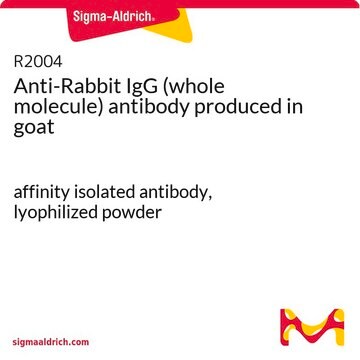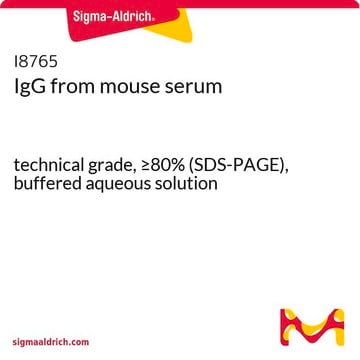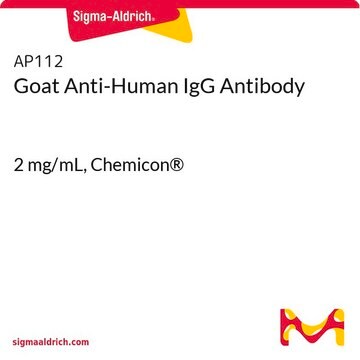I5006
IgG from rabbit serum
reagent grade, ≥95% (SDS-PAGE), essentially salt-free, lyophilized powder
Synonym(s):
Rabbit IgG
Sign Into View Organizational & Contract Pricing
All Photos(4)
About This Item
Recommended Products
conjugate
unconjugated
Quality Level
grade
reagent grade
Assay
≥95% (SDS-PAGE)
form
essentially salt-free, lyophilized powder
storage temp.
2-8°C
Looking for similar products? Visit Product Comparison Guide
General description
IgG antibody subtype is the most abundant serum immunoglobulins of the immune system. It is secreted by B cells and is found in blood and extracellular fluids and provides protection from infections caused by bacteria, fungi and viruses. Maternal IgG is transferred to fetus through the placenta that is vital for immune defence of the neonate against infections
Rabbit IgG is purified from normal rabbit serum by fractionation and ion-exchange chromatography.
Rabbit IgG is purified from normal rabbit serum by fractionation and ion-exchange chromatography.
Application
Purified rabbit IgG may be used as a reference antigen, standard, blocking agent, or coating protein in a variety of immunoassays including ELISA, dot immunobinding, Western immunoblotting, immunodiffusion, and immunoelectrophoresis. Other applications include starting materials for the preparation of immunogens and solid phase immunoadsorbents. Rabbit IgG was used to reduce non-specific binding in immunoprecipitation of protein extracts and as control antibody in radioimmunoassay immunocytochemistry and immunohistochemistry. Rabbit IgG was also used as a standard to demonstrate the performance of land-contrast (LC) BioCD (protein array) and in neutralization assays.
Disclaimer
Unless otherwise stated in our catalog or other company documentation accompanying the product(s), our products are intended for research use only and are not to be used for any other purpose, which includes but is not limited to, unauthorized commercial uses, in vitro diagnostic uses, ex vivo or in vivo therapeutic uses or any type of consumption or application to humans or animals.
Storage Class Code
11 - Combustible Solids
WGK
WGK 3
Flash Point(F)
Not applicable
Flash Point(C)
Not applicable
Personal Protective Equipment
dust mask type N95 (US), Eyeshields, Gloves
Certificates of Analysis (COA)
Search for Certificates of Analysis (COA) by entering the products Lot/Batch Number. Lot and Batch Numbers can be found on a product’s label following the words ‘Lot’ or ‘Batch’.
Already Own This Product?
Find documentation for the products that you have recently purchased in the Document Library.
Customers Also Viewed
Gisèle Dewhurst-Maridor et al.
Molecular biology of the cell, 28(20), 2637-2649 (2017-08-05)
Changes in cellular sterol species and concentrations can have profound effects on the transcriptional profile. In yeast, mutants defective in sterol biosynthesis show a wide range of changes in transcription, including a coinduction of anaerobic genes and ergosterol biosynthesis genes
Land-contrast self-referencing interferometric protein microarray
Wang W et al
Applied Physics Letters, 93, 223904-223904 (2008)
Ping Li et al.
PLoS genetics, 13(6), e1006830-e1006830 (2017-06-14)
Centrosomes organize microtubules and are essential for spindle formation and chromosome segregation during cell division. Duplicated centrosomes are physically linked, but how this linkage is dissolved remains unclear. Yeast centrosomes are tethered by a nuclear-envelope-attached structure called the half-bridge, whose
Olivier Lepage et al.
The Journal of experimental biology, 206(Pt 20), 3589-3599 (2003-09-11)
Isolated juvenile rainbow trout were fed a feed supplemented with L-tryptophan (TRP) for 3, 7 or 28 days, after which they were either sampled directly (undisturbed) or subjected to a standardised stressor prior to sampling. Controls (stressed and undisturbed) received
Mehdi Hichor et al.
Antioxidants & redox signaling, 27(3), 168-183 (2016-10-30)
Paraquat (PQT), a redox-active herbicide, is a free radical-producing molecule, causing damage particularly to the nervous system; thus, it is employed as an animal model for Parkinson's disease. However, its impact on peripheral nerve demyelination is still unknown. Our aim
Our team of scientists has experience in all areas of research including Life Science, Material Science, Chemical Synthesis, Chromatography, Analytical and many others.
Contact Technical Service













